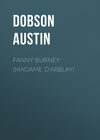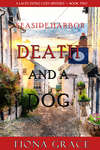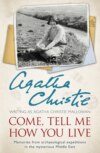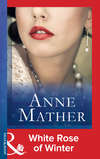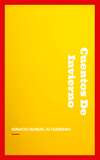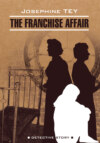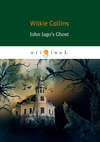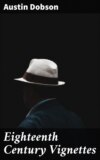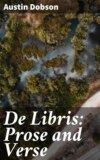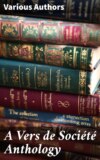Kitabı oku: «Fanny Burney (Madame D'Arblay)», sayfa 2
Before dealing with those portions of this chronicle which concern the present chapter, it is necessary to say something of the proceedings of the father of the family. In 1769 Mr. Burney, of whom we shall hereafter speak as “Dr.” Burney, received his Mus. D. degree at Oxford, his preliminary exercise being an anthem which was performed in the Music School, where it “was received with universal applause.”9 The chief vocalist was one of the Doctor’s pupils, Miss Jenny Barsanti, often referred to in the Diary; and Fanny wrote some congratulatory verses to her father on his distinction, which, at all events, exhibit a knack of rhyming. The receipt of his degree appears to have revived all Dr. Burney’s dormant literary ambitions. In matters connected with his profession he had always been an industrious note-taker; and he was also much interested in astronomy. One of the results of this last taste was an anonymous pamphlet prompted by the comet of 1769, at the close of which year it was published. To this was appended the translation from Maupertuis by the first Mrs. Burney, of which mention has been made. The Essay on Comets attracted no notice; but it served to strengthen its author’s hand; and he began systematically to look over the miscellaneous collections he had accumulated towards that History of Music of which he had dreamed at Lynn. In arranging and transcribing the mass of material, Fanny fell naturally into the office of amanuensis and keeper of the records. But these had not long been manipulated before her father discovered that it would be necessary for him to make a personal tour in France and Italy, – first, to procure information in regard to ancient music, and secondly, to ascertain, by ear and eye, the actual condition of the musical art on the Continent. At Paris he visited Rousseau and Diderot, both of whom were interested and helpful. At Ferney he had a chance interview with Voltaire, then seventy-eight and wasted to a skeleton, but still working ten hours a day, and writing without spectacles. Discord, rather than harmony, was the topic of this conversation. The quarrels of authors – Voltaire held – were good for letters, just as, in a free government, the quarrels of the great and the clamours of the small were necessary to liberty. The silence of critics (he said) did not so much prove the age to be correct, as dull. Dr. Burney had started in June 1770; he did not return until January 1771, when he almost immediately buried himself at Chessington to prepare his notes and journal for the press. In the following May his book was printed under the title of The Present State of Music in France and Italy; or, the Journal of a Tour through those Countries, undertaken to collect Materials for a General History of Music; and it obtained a considerable success. Copies went to Mason, Hawkesworth, Garrick, and Crisp, all of whom had aided in its progress. Among its other readers must have been Johnson, who told Mr. Seward that he had “that clever dog, Burney” in his eye when, two years later, he wrote his own Journey to the Western Islands of Scotland.10
During Dr. Burney’s absence abroad, his wife had found the Poland Street house too small. She accordingly fixed upon a fresh residence in Queen Square, Bloomsbury, which was then much more in the country than it is at present. The new home was at the upper end of the square, which had been considerately left open by the architect so as to afford a delightful prospect, across Lamb’s Conduit Fields, of Highgate and Hampstead, which Miss Burney – we regret to say – spells “Hygate and Hamstead.” There was also a special interest in the house itself, for it had once been inhabited by Queen Anne’s printer, Alderman Barber, the “Johannes Tonsor” and “very good and old friend” of Swift; and it was a fond tradition of the Burney household that the author of Gulliver’s Travels had often dined with Barber at Queen Square. But the Journal to Stella, when it mentions Barber, invariably refers to him as in the City; and it is probable that Swift visited him uniformly at his place of business. In any case, the Queen Square house was “well fitted up, convenient, and handsome.” Especially was there a closet or playroom up two pair of stairs where Fanny could retire to compose her Diary, for which task, during her father’s absence abroad, she had unexpected opportunities. But she had also another, and more picturesque asylum in her step-mother’s dower-house at Lynn. At the end of a long side garden was a “Look Out” or Gazebo, called “The Cabin,” from which ships could be seen on the Ouse. Here, except when she was driven from it to the more secluded garden by the profane language of the seafaring population, she was accustomed to write and dream at her ease.
Dr. Burney’s activity did not permit him to pause long after his first book. Very soon we hear that he is learning German, – no doubt with a purpose. In July, 1772, he set out upon a second tour, this time to collect materials for his history in Germany and the Netherlands. During his absence, which lasted five months, his family lived mainly at Lynn and Chessington. In December he returned to England, terminating his travels by an unique experience. Upon his passage to Dover, in the very stormy winter of 1772, he was so exhausted by sea-sickness that he fell asleep in his berth, and was carried back again to Calais. On reaching Queen Square he had a severe illness, requiring to be carefully nursed by his family; but, with his customary energy, dictated to his daughters, from his bed, portions of the new Tour whenever the intervals of pain permitted him to do so. As soon as he was convalescent, he hastened off to Chessington, carrying his secretaries with him. The result of his labours was at press in February, 1773, and was published in May. It was received even more kindly than its predecessor, and included detailed Proposals for the forthcoming General History of Music. Not many months after, in consequence of difficulties as to title, the Queen Square house was given up, and the Burneys moved to Leicester Fields.
With some account of the next new house, which had, even then, its history, we may fitly open a fresh chapter. In closing this one, however, something must be said as to that Early Diary which Fanny Burney began to keep in May 1768. When, in 1842-6, her Diary and Letters were edited by her sister Charlotte’s daughter, Mrs. Charlotte Francis Barrett, an amiable and learned lady who happily combined a knowledge of Hebrew with a genius for making jelly, it was thought right to withhold the portions preceding the publication of Evelina, as being “of a more private and personal nature than that which attaches to the Journal after its writer became universally known.” But in 1889, this earlier portion also was edited by the late Mrs. Annie Raine Ellis from the original mss. which the first writer, in her own words, had freely “curtailed and erased of what might be mischievous from friendly or Family Considerations.” One of the explanatory memoranda states, and another repeats, that the record was begun at the age of fifteen. Prefixed to the Diary, and “Addressed to a Certain Miss Nobody,” is a whimsical Introduction, which Mrs. Barrett reproduced in facsimile at the beginning of the Diary and Letters of 1842-6. This, of course, may be earlier than the rest, as it is said to be on older paper, and in a slightly different hand. The Diary that follows, as already stated, was considerably revised by the writer in her old age; and, as reprinted in 1889, shows numerous omissions. Of the record for 1769, for example, Mrs. Ellis says, “Much has been cut from the Diary of this year, and it has many erasures. It appears to have been in two or three cahiers, which all lie now within one quarto sheet of paper, so much are they shrunk in size.” There are also large excisions in the accounts for 1771 and 1772; and the manuscript everywhere bears token of wholesale obliterations. Where these are Miss Burney’s own, they are said to be so effectual that scarcely a word can be read. In future chapters, we shall take leave to make sundry extracts from the Burney chronicle; but in this, where only a brief period (1768-73) is in question, we may fairly confine our citations to a few notes, relating mainly to the diarist and her method.
In the first lines of her address to Nobody, Miss Burney defines her purpose. The reason, she says, which induces her to keep a Journal is that, “when the hour arrives in which time is more nimble than memory,” she may have some account of her “thoughts, manners, acquaintance and actions.” Writing in the Cabin at Lynn a little later, she reverts to this idea. “I cannot express the pleasure I have in writing down my thoughts, at the very moment – my opinion of people when I first see them, and how I alter, or how confirm myself in it – and I am much deceived in my fore sight, if I shall not have very great delight in reading this living proof of my manner of passing my time, my sentiments, my thoughts of people I know, and a thousand other things in future – there is something to me very unsatisfactory in passing year after year, without even a memorandum of what you did, etc.” Presently, she has her difficulties. Dr. Burney comes upon a fugitive page of this chronique intime, and though he does not forbid the practice, protests that if he finds it lying about he will post it up in the market place. Then one of her mother’s friends, Miss Dorothy Young (whom the first Mrs. Burney on her death-bed had recommended her husband to marry) had her doubts about this “most dangerous employment.” “Suppose now,” says Miss Young, “your favourite wish were granted, and you were to fall in love [it may be noted that Fanny had already confided this tender aspiration to her pages], and then the object of your passion were to get sight of some part which related to himself?” Here was an appalling suggestion, to which Fanny could only reply that she should have to take a precipitate trip to Rosamond’s Pond in St. James’s Park, then the last resort of the despairing. It is characteristic of this very early entry in the Diary, that the conversation is given exactly as if it had been reported in shorthand. As the record progresses, there are many similar instances of this practice, which greatly irritated distrustful Mr. Croker. “I shall recollect as much of the conversation as I can, and make the parties speak for themselves,” Miss Burney writes of a long interview with the currish misogynist and Tory, Dr. John Shebbeare. And then follows a dialogue to which the names of the speakers are prefixed as they would be in a play.
Some of the most interesting entries at this date relate to her reading, and show that, instead of being, as Lord Macaulay supposed,11 an infrequent student of novels, her activity in this way was fully equal to her opportunities. Richardson’s works she must have known intimately, as she reminds her sister of their early love for him; she reads and cries over and criticises the Vicar of Wakefield; she reads Rasselas, and thinks the style and sentiments inimitable. The subject however is dreadful. “How terrible is it to be told by a man of his [Johnson’s] genius and knowledge, in so affectingly probable a manner, that true, real, happiness is ever unattainable in this world!” The Sentimental Journey, – which was a special favourite with her step-mother, – she read three times; and, from a reference to “Hobby Horses,” was probably acquainted with Tristram Shandy, or at all events with its famous eighth chapter. Stranger still, she had not only read Prévost’s Doyen de Killérine (with which she is delighted), but that very stimulating work, the Vie de Marianne of Marivaux. Further, she occasionally quotes much inferior productions, e. g. the Henry and Frances of Mrs. Griffiths, the Lady Julia Mandeville of the once-popular Mrs. Brooke, and the Lydia of Shebbeare. These are advanced mainly in answer to Lord Macaulay. But the Diary contains numerous references to studies of a sterner sort. Among the books she speaks of reading, are Plutarch’s Lives, Pope’s Iliad and Odyssey, Hawkesworth’s Telemachus, Hume, Smollett, Smith’s Thucydides, Middleton’s Cicero, Hooke’s Roman, and Stanyan’s Grecian History, – all of which she professes to go through systematically. Here is strong meat enough, one would imagine, for a budding Mme. Roland; – certainly it would be a trying course, in the days when skipping was unknown, for even that model and methodical student, Miss Clarissa Harlowe. Moreover it proves plainly that Fanny’s close attention to braid-stitch, cross-and-change, pinking, pointing, frilling, and all the other niceties of that needlework which her step-mother regarded as so important to young persons – did not leave her without leisure for literature.
To give any detailed summary of the material contained in the first four years of Miss Burney’s Diary would be impracticable here. There are several portraits which (like that of Dr. Shebbeare) show that the writer’s pen is already working willingly and easily in what was to be her most congenial field. There is a long description of the forgotten Spanish traveller, Mr. Richard Twiss, a polyglot eccentric of the first water; there is another of a delightful fop and cousin, Richard Burney, of Worcester, Junr., the son of Dr. Burney’s elder brother; there is a picturesque Journal, addressed to Susan in 1773, of a visit to Teignmouth, – or “Tingmouth,” as the writer calls it, – which Mrs. Ellis fairly characterises as “Fanny’s first book, privately circulated,” and which contains some lively sketches of rural sports and watering-place oddities. Some of these descriptions and portraits go off in letters to “Daddy” Crisp at Chessington, who is delighted, and gives his “dearest Fannikin” some very seasonable advice, which, in after years, she unhappily neglected. “If once you set about framing studied letters, that are to be correct, nicely grammatical, and run in smooth periods, I shall mind them no otherwise than as newspapers of intelligence… There is no fault in an epistolary correspondence like stiffness and study. Dash away whatever comes uppermost; the sudden sallies of imagination, clap’d down on paper, just as they arise, are worth folios… Never think of being correct when you write to me.” Not the least notable of Fanny’s records are the glimpses we get of some of her father’s friends. One is poor mad Kit Smart, always needy and out-at-elbows, with whom Burney had grown acquainted at Arne’s, and who died in 1772 in the King’s Bench Prison. Another, who also died in this period, is Hawkesworth, whose end, according to Fanny, was certainly hastened by the attacks made upon him in connection with his subsidised publication of Cook’s Voyages. Garrick more or less pervades the chronicle, dashing into the house in the most unexpected manner; rushing away with little Charlotte whom he declares to be the image of Comedy in Reynolds’s picture; acting, grimacing, mimicking, posturing, and altogether comporting himself in every respect like the excellent friend and histrion he was. Fanny often sees him play – as Bayes in the Rehearsal; as Richard the Third; as Lear, and as Abel Drugger in the Alchemist. Of “crook’d back’d Richard” she says, – “It is inconceivable how terribly great he is in this character! I will never see him so disfigured again; he seemed so truly the monster he performed, that I felt myself glow with indignation every time I saw him. The applause he met with, exceeds all belief in the absent. I thought at the end they would have torn the house down: our seats shook under us.” Of Lear, – “He was exquisitely great; every idea I had formed of his talents, although I have ever idolized him, was exceeded.” But she very properly blames Cibber’s feeble alterations of Shakespeare’s work. As to Abel Drugger, perhaps Garrick’s greatest part, she says: – “Never could I have imagined such a metamorphose as I saw; the extreme meanness, the vulgarity, the low wit, the vacancy of countenance, the appearance of unlicked nature in all his motions.” These are more than the opinions of an “unlessoned girl,” for they are confirmed to the full by experienced spectators such as Lichtenberg and Mme. Necker. To Goldsmith, then not far from his end, there is passing reference. “Dr. Goldsmith” – says the diary in May, 1773, – “has just brought on the stage a new comedy, called, ‘She stoops to Conquer.’ We went to it with Mr. and Mrs. Young; it is very laughable and comic; but I know not how it is, almost all diversions are insipid at present to me, except the opera.” There is another mention of Goldsmith a few pages further on. It relates to his projected Dictionary of Arts and Sciences. Among other contributors, Dr. Burney was to undertake the article “Musician.” But the plan never got beyond the prospectus stage. Goldsmith died in the following year, and Dr. Burney’s paper probably found its ultimate place in his own History of Music.
CHAPTER II
NO. 1, ST. MARTIN’S STREET
No. 1, St. Martin’s Street, now No. 35, to which the Burneys moved early in 1774, may fairly be described as a house with a history. We say “now,” since it still exists, – standing to the right at the top of the little street which opens into Leicester Square from the south; and having on its left that Orange Street Congregational Church where, in its Huguenot days, was wont to preach Wesley’s opponent, – the Rev. Augustus Montague Toplady. The house itself, once red brick, but at present stuccoed over, is not impressive, save for the distinction conferred by a Society of Arts tablet which proclaims it to have been formerly the residence of Newton. Miss Burney, indeed, as her father supposed, declares that Sir Isaac built it; but this is an error. He took it in 1710, when he was nearing seventy, and he lived in it until 1725, two years before he died at Kensington. Beyond occasional visits to the Princess Caroline at Leicester House on the opposite side of the Fields; and the fact that he superintended the production of two editions of the Principia during his period of residence, no very definite traditions belong to his sojourn in St. Martin’s Street. But Dr. Burney, who valued literary association, had a better reason for connecting his new house with Swift, than he had for connecting him with Queen Square. For in Newton’s house in St. Martin’s Street had certainly dwelt one of Swift’s intimates and Newton’s relatives, the beautiful and witty Catherine Barton, – the “jolie nièce” of Voltaire, – and the “Super-intendant of his domestick Affairs” to Charles Montagu, Earl of Halifax, to whom, it is conjectured, she was privately married. After the death of Halifax in 1715, she became the wife of John Conduitt, Newton’s successor as Master of the Mint; and, when in town, was accustomed to reside with her uncle in Leicester Fields. And it is no great stretch of imagination to assume that, at such times, though Swift himself was in exile, she was visited by the other old friends who had clustered around her when she was a Toast of the Kit Cats. The chairs of Lady Worsley and Lady Betty Germaine must often have waited at the narrow approach by which the street was then entered from the Fields, while their mistresses “disputed Whig and Tory” with Mrs. Conduitt, or were interrupted in a tête-à-tête by Gay and the Duchess of Queensberry.12
As regards situation, the change from Queen Square to St. Martin’s Street was not entirely for the better. It was no small loss to substitute an “unpleasant site,” “confined air,” and a “shabby immediate neighbourhood” for the unobstructed view of “Hampstead’s breezy Heath” which the Bloomsbury home afforded.13 But in the way of convenience, and a central position, the difference was great, in addition to which, compared with its predecessor, the new residence was “large and good.” It is true that the stairs were so steep and narrow that one of Fulke Greville’s friends broke his sword in climbing them; but, on the other hand, most of the rooms were panelled, and one, at least, of the ceilings “prodigiously painted and ornamented,” not, as the Doctor was careful to explain, by him, but by previous occupants. The chief glory of the house, however, was the unpretentious structure at the top, which passed for Sir Isaac’s observatory. It is perhaps safest to say “passed,” because, between 1725 and 1774, there must have been other dwellers in No. 1, St. Martin’s Street, and many things may have happened. But the Burneys seem to have devoutly believed in the small-paned, wooden turret, with the leaden roof and tiny fireplace, which embodied so respectable a tradition. They exhibited it religiously to their visitors; and one of its new owner’s first acts was to put it into repair. When, four years later, it was all but whirled away by the hurricane of 1778, he practically rebuilt it. And it was unquestionably Fanny’s chosen retreat and scriptorium. “His [Newton’s] observatory is my favourite sitting place, where I can retire to read or write any of my private fancies or vagaries.” And then follows what – having regard to some of her previous utterances – is more interesting than unexpected.14 “I burnt all up to my fifteenth year – thinking I grew too old for scribbling nonsense, but as I am less young, I grow, I fear, less wise, for I cannot any longer resist what I find to be irresistible, the pleasure of popping down my thoughts from time to time upon paper.”
Whatever may have been her exact age at the date of the famous auto-da-fé in the paved court at Poland Street, she must have been nearing two and twenty when she “popped down” the foregoing passage; and the moment, taken in connection with the change of scene from Bloomsbury to Leicester Fields is a favourable one for reviewing the Burney family circle in 1774-5. Dr. Burney’s second or German Tour, as we know, had been published in 1773; and in the same year he had been made a Fellow of the Royal Society. At present, in the intervals of rheumatism, he was working, with Fanny’s aid, at his History of Music. By his second wife he had two children, – Richard, and Sarah Harriet, the latter of whom eventually, like her gifted half-sister, became a novelist. But both Richard and Harriet, at this date, were in the nursery. Esther, or Hetty, the eldest daughter, had been married for some time to her cousin, Charles Rousseau Burney, afterwards of Bath, a musician and former pupil of her father; while Maria Allen, the daughter of Dr. Burney’s second wife, was married to a Mr. Rishton. James Burney, the sailor, having sailed with Cook in his second voyage, and been made a lieutenant, had now returned home. In 1775 he was serving on the North American Station, when he was recalled to accompany Cook on his third and fatal expedition. Of the rest, Susan and Charlotte were now grown up, Charlotte being about fifteen, and Susan some years older. Charles, after having enjoyed the reputation of being “the sweetest-tempered boy in the Charterhouse School,” was now, in all probability, pursuing at Cambridge those studies for which he was eventually to be classed with Porson and Parr. The only one of the Queen Square frequenters no longer to be encountered at St. Martin’s Street was “Daddy” Crisp. By this date he was sixty-eight, and his fits of gout had become so severe, that he had ceased to make his annual descents upon London from his Surrey hermitage. But his interest in all that befell his friends at Leicester Fields remained unabated; and in this he was kept carefully posted up by his favourite “Fannikin,” who, what with acting as librarian and amanuensis to her indefatigable father, writing periodical news-letters of “from six to twelve large quarto pages” to Chessington, and keeping her own voluminous journal besides – must have been very actively employed both in the Observatory and out of it. Not without reason can it have been that she acquired the “murtherous stooping” which her Mentor deplored, nor was it entirely chargeable to the shortness of sight which she shared with Charlotte Brontë. It is from her bright and graphic despatches to Mr. Crisp that we propose to draw most of the material for this chapter. Often these are repeated in her Diary, and they are also expanded in the Memoirs of Dr. Burney which she wrote in later years; but they are at their best and freshest in her letters, – letters which, in many cases, must have been scribbled off immediately after the occurrence of the events they described. From one of them it is clear that their writer thought nothing of setting to work at what would now be considered a very lengthy epistle, when the entertainment of the evening had come to an end.
The Queen Square circle had already been sufficiently diversified; but it grew wider and even more varied at Leicester Fields. Some of the Doctor’s friends were now in his immediate vicinity. The family of Mr. (afterwards Sir Robert) Strange, the engraver, – old Paris acquaintances, – were, for the moment, lodging close by. Reynolds, who had just painted the beautiful Eliza Linley (Mrs. Sheridan) as “St. Cecilia,” lived only just across the Fields at No. 47; and Garrick, in the new house recently built for him by the brothers Adam at the Adelphi, was not too far off to be a frequent looker-in. Another artistic friend was the sculptor, Joseph Nollekens, whom Burney had met in Italy. James Barry, the eccentric and pugnacious Irish painter from Castle Street, then engaged in decorating the Meeting Room of the Society of Arts with vast designs (in one of which Dr. Burney, in a queue and tye-wig, figures incongruously among the nymphs of the Thames), – was also among the familiar faces. But the majority were naturally persons who were more or less attracted to the Historian of Music. In this category comes James Harris of Salisbury, “a most charming old man,” – says Fanny, not only the author of Hermes, but a writer upon Music, and a composer whose pastoral of Daphnis and Amaryllis had actually been produced at Drury Lane. With him was his wife, the delightful Mrs. Harris whose gossiping letters to her son, the first Earl of Malmesbury, are some of the most charming in their kind. Then there was another new friend, whom the Burney girls grew to love almost as much as “Daddy” Crisp himself, the Rev. Thomas Twining of Fordham, near Colchester, afterwards the translator of Aristotle’s Treatise on Poetry. His acquaintance with Dr. Burney had begun over the German Tour, for Twining, too, had meditated a History of Music, which he abandoned in favour of Burney’s. “They were far from young when they met,” – says Twining’s brother and biographer referring to the new friends, – “and they could ill afford to lose time.”15 Besides these, there were the foreign professionals who regarded the author of the Tours as the supreme arbiter in matters musical: – the celebrated soprano, Lucrezia Agujari, otherwise the Bastardini; the almost equally celebrated Caterina Gabrielli, and the Inglesina, Cecilia Davies; while the men were represented by the singer and composer, Rauzzini, who is so much commended in the German Tour, by Gasparo Pacchieroti and others. Finally, there were the “Lyons,” – as the diarist calls them, – the Otaheitan Omai, who had come from the Society Islands with Lieutenant Burney; and the Abyssinian traveller, James Bruce of Kinnaird; and last, but by no means largest, for Bruce was six feet four, the Russian “man-mountain,” Alexis Orloff, who had certainly helped to strangle his Imperial Master, Peter iii., and was also – though not so surely – the reputed favourite of that terrible Czarina who, according to Walpole, had even more teeth than the famous Wild Beast of the Gévaudan. The goings and comings of these, and other notables and notorieties, – for those mentioned by no means exhaust the list, – must have been an unexampled school of character to a budding novelist, whose gift lay especially in seizing upon the peculiarities of human nature, whose perceptions were at their freshest and keenest, and whose singularly retentive memory was not yet perplexed and bewildered by too prolonged an experience of the very variegated patchwork of Eighteenth Century society.
Among the first visits to St. Martin’s Street that Fanny chronicles is one from that “most entertaining of mortals, Mr. Garrick.” He arrived, as usual, very early in the morning, marching straight into the study where Dr. Burney, “surrounded by books and papers innumerable,” was having his hair dressed. Fanny was making breakfast; Charlotte reading the paper. Nobody else was a-stir. “My father,” – says Miss Burney, – “was beginning a laughing sort of apology for his litters, and so forth, but Mr. Garrick interrupted him with ‘Aye now; do be in a little confusion; it will make things comfortable!’ ” He then began to look gravely at the hairdresser. (Dr. Burney, it may be stated in parenthesis wore his own hair, – a crop so bushy and luxuriant that Frances Reynolds persisted in regarding it as artificial.) “He (Garrick) was himself in a most odious scratch-wig, which nobody but himself could dare to be seen in. He put on a look in the Abel Drugger style of envy and sadness, as he examined the hairdresser’s progress; and, when he had done, he turned to him with a dejected face, and said, ‘Pray Sir, could you touch up this a little?’ taking hold of his own frightful scratch.” At which the hairdresser only grinned, and left the room. But Garrick continued his proceedings in the same mirthful spirit. He made enquiries as to the progress of the History of Music, protesting that he was only waiting to blow the trumpet of Fame, which he forthwith proceeded to do with a stick, after the fashion of a Raree-Show-man. “Here is the only true History, Gentlemen; please to buy, please to buy. Sir, I shall blow it in the very ear of yon scurvy magistrate” – by whom he meant Sir John Hawkins of Twickenham, whom Horace Walpole had incited to a rival performance. His final exploit, after mimicking the Spanish traveller, Twiss, and Dr. Arne, Burney’s old master, was to give a dramatic rendering of an interview he had recently had with Johnson, – not yet personally known to the young ladies. Johnson had asked Garrick to lend him a book, and Johnson’s carelessness about books was notorious. “ ‘David, will you lend me Petra[r]ca?’ ‘Yes, Sir.’ ‘David, you sigh.’ ‘Sir, you shall have it.’ Accordingly, the book, finely bound, was sent, but scarce had he received it, when uttering a Latin ejaculation (which Mr. Garrick repeated) in a fit of enthusiasm, – over his head goes poor Petra[r]ca, – Russia leather and all!”16 After this the mercurial actor bustled off to give breakfast to Boswell, promising to come soon, and plague them again. By the Burney household Garrick was idolised; but Miss Burney hints that where he was not on cordial terms, he could contrive to make himself extremely disagreeable.
